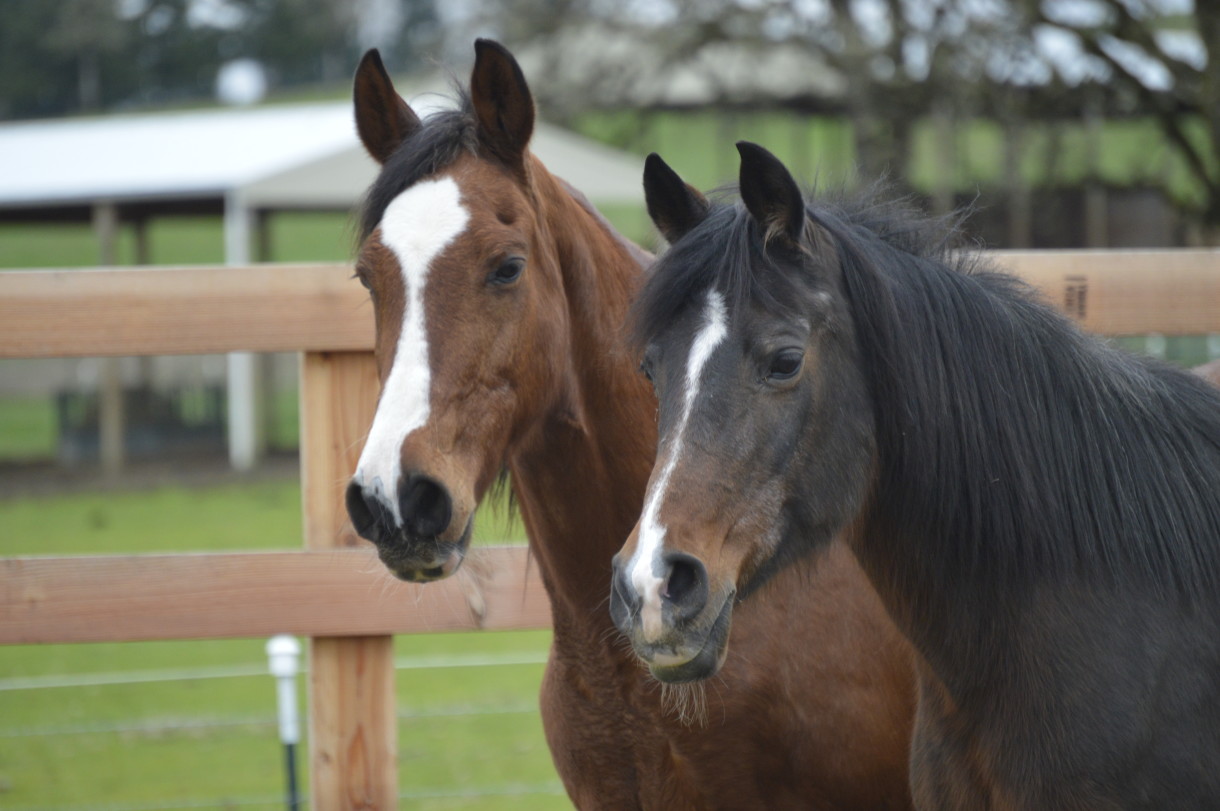
We don’t round up dogs and cats,
butcher them, and ship them to foreign markets, and it should be
unthinkable to do that with horses, a species that helped us settle the
nation. Above, Captain and Anna, rehabbed horses at the Duchess
Sanctuary. Photo by Jennifer Kunz/The HSUS
President and CEO of The Humane Society of the United States
The $1.1 trillion omnibus spending bill, released early this morning and set for final action in the House and Senate later this week, turned out extraordinarily well for animal protection advocates. The negotiations were led by Senate leaders Mitch McConnell, R-KY, and Harry Reid, D-NV, and House leaders Paul Ryan, R-WI, and Nancy Pelosi, D-CA, along with the chairmen and ranking members of the House and Senate appropriations committees.
Negotiators did the right thing and included language to forbid anyone from setting up a horse slaughter plant on American soil. We don’t round up dogs and cats, butcher them, and ship them to foreign markets, and it should be unthinkable to do that with a species that helped us settle the nation. We’ve secured this language in nine of the last 11 year-end agriculture spending bills, but the measure was in jeopardy this year, with a key House committee blocking it in a tie vote 24 – 24 during consideration of the FY2016 agriculture bill. Yet in final negotiations on the omnibus measure, with a huge lift from Representative Pelosi and Senator Reid, we held on to the funding ban, preventing any new slaughter plants from breaking ground or any repurposing of some existing facility. As many as 104 House members, led by Reps. Sam Farr, D-CA, Frank Guinta, R-NH, and Vern Buchanan, R-FL, wrote to lead negotiators to keep the anti-horse-slaughter language in the bill, while 13 Representatives, led by Reps. Adrian Smith, R-NE, and Markwayne Mullin, R-OK, led the pro-slaughter forces. Senators Robert Menendez, D-NJ, and Lindsey Graham, R-SC, led the lobbying efforts against horse slaughter on the Senate side.
And lawmakers had the good sense to keep their paws off wolves. These animals occupy just a fraction of their original range, and the ancestors of the domesticated dog should continue to be protected from zealots who want to kill them in a head-hunting pursuit. This was a fierce battle, with Senators Ron Johnson, R-WI, and John Barasso, R-WY, along with Representatives Reid Ribble, R-WI, and John Kline, R-MN, introducing free-standing bills for delisting wolves. We fought off this provision also, retaining protections for the time being and potentially forestalling the slaughter of up to 1,000 wolves in 2016. We prevented that slaughter in 2015 by winning landmark federal court cases at the end of 2014 to restore federal protections for wolves. We got a major boost in the battle against Congressional delisting from 70 scientists who wrote to Congress saying they favored continued wolf protection. Congressional leaders also played a key role in this fight: Senators Cory Booker, D-NJ, and Barbara Boxer, D-CA, penned a letter with 23 other Senators indicating they opposed any anti-Endangered Species Act riders in the final spending package, including one delisting wolves. Rep. Raul Grijalva, D-AZ, led a letter with 91 other House members expressing the same sentiment. Rep. Niki Tsongas, D-MA, also took a stand for wolves this summer when she offered an amendment to the House Interior Appropriations bill stripping the bad wolf delisting rider. These lawmakers drew a line in the sand on the issue, and it made a huge difference in final negotiations.
The omnibus provides strong funding levels for Animal Welfare Act and Horse Protection Act enforcement, anti-wildlife trafficking efforts, and the development of alternatives to animal testing through a key program at the National Institutes of Health. It also incorporates by reference helpful committee report language calling on the NIH to review its ethical policies and processes for nonhuman primate research and calling on USDA to issue its long-delayed proposed rule to establish more humane standards of care for orcas and other captive marine mammals.
To review, the omnibus bill:
- Prohibits the use of funds to allow horse slaughter plants to open in the United States and reiterates federal standards against sending any wild horses to slaughter in this or any other country.
- Retains Endangered Species Act protections for gray wolves, and rejects congressional attempts to delist the species in the Great Lakes region and in Wyoming.
- Contains strong language criticizing the USDA for abuses of farm animals at a federal agricultural research facility. The New York Times brought to light terrible abuses of animals at the U.S. Meat Animal Research Center, and The HSUS followed up by advocating for changes at USMARC and at 50 other federal research facilities. Language in the omnibus seeks to prevent a recurrence by requiring tougher animal welfare standards.
- Allows the U.S. Fish and Wildlife Service to crack down on the domestic trade in ivory to protect elephants from poaching. There was a rider in the House Interior spending bill to block the Fish and Wildlife Service from rulemaking on the issue, but this provision was jettisoned in the final bill, clearing the way for a rulemaking by the Obama Administration. That rule is expected to come out as early as February.
- Denies funds for USDA’s licensing or relicensing of Class B animal dealers who sell “random source” dogs and cats for use in research, often obtained from animal shelters, flea markets, or “free to a good home” ads (and sometimes from pet theft), following a successful amendment by Rep. Roybal-Allard, D-CA, to the House committee bill.
source


No comments:
Post a Comment